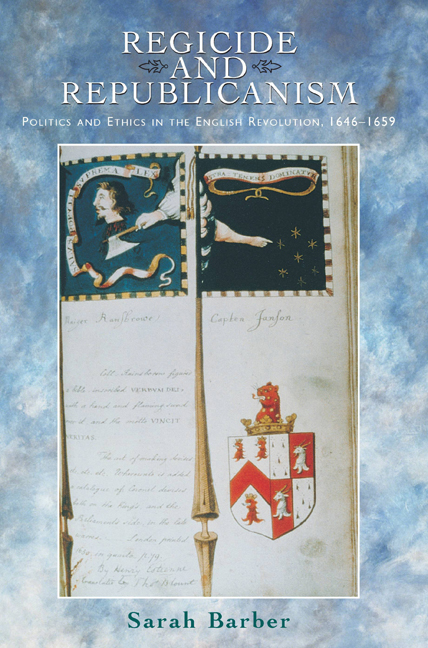Book contents
- Frontmatter
- Contents
- Preface
- List of Abbreviations
- Introduction: Regicide and Republicanism
- 1 Unparliamentary Language and the Dignity of the Crown
- 2 ‘A Mere Man’: Charles Levelled
- 3 The Expense of Blood and Treasure
- 4 King Ahab
- 5 Queen Justice
- 6 Government New Modelled?
- 7 The Engagement of Loyalty
- 8 The Active and the Passive Life
- Epilogue: The Good Old Cause
- Select Bibliography of Printed Sources
- Index
8 - The Active and the Passive Life
Published online by Cambridge University Press: 03 October 2020
- Frontmatter
- Contents
- Preface
- List of Abbreviations
- Introduction: Regicide and Republicanism
- 1 Unparliamentary Language and the Dignity of the Crown
- 2 ‘A Mere Man’: Charles Levelled
- 3 The Expense of Blood and Treasure
- 4 King Ahab
- 5 Queen Justice
- 6 Government New Modelled?
- 7 The Engagement of Loyalty
- 8 The Active and the Passive Life
- Epilogue: The Good Old Cause
- Select Bibliography of Printed Sources
- Index
Summary
The patience which the army grandees had shown towards the parliament's efforts at reform finally ran out on 20 April 1653. Cromwell called his troops into Westminster Hall and forcibly ejected the Rumpers from power. Subsequently, the reasons for Cromwell's actions have been thoroughly investigated. It is now generally thought that he was dissembling when he issued a declaration two days later in defence of his actions. He accused the House of intending to introduce a bill to recruit further members, whereas it is believed that it was in fact about to call fresh elections on conditions which would have minimised the army's future role. However, the committee which had been discussing the new representative had maintained a policy of recruitment from its inception, so complete elections would have represented a late change of strategy.
There was no edition of Mercurius Politicus for the week 21 to 28 April and the edition which followed began ‘[a]ll is quiet in the Highlands. Nedham then printed Cromwell's declaration in full, with the rather throwaway fine that it had already been published, but his newspaper claimed to give an overview of news. Although a ‘matter of such concernment’ could not be ‘let slip’, coverage of the fall of the Rump parliament was scant. The presses seem effectively to have been shut down. The anger of those whose power depended on the Rump does emerge, but not in print. The outrage of Rumpers has to be gleaned from the scanty manuscript sources which remain. Thomason copied by hand one of the very few defences of the Rump and both he and Henry Marten obtained manuscript copies of a satirical poem about Lenthall's ability to retain his place despite the changing regimes around him. Marten — whose creditors were chipping away at his power, waiting for him to fall — prepared some scathing attacks on Cromwell and the army, some of which were pastiches of the encomiums to the General which appeared around the city. The Commonwealth of 1649 to 1653 had been, according to Marten, ‘the best frame of lawes yett extant in ye World’.In his return to first principles, Marten compared the purge of 1648 with the ‘invasion’ of 1653, quite deEberately choosing terms which referred to change from within the charmed circle of governance which represented English liberties, and something which collapsed a polity from outside.
- Type
- Chapter
- Information
- Regicide and RepublicanismPolitics and Ethics in the English Revolution, 1646–1659, pp. 202 - 228Publisher: Edinburgh University PressPrint publication year: 2020

